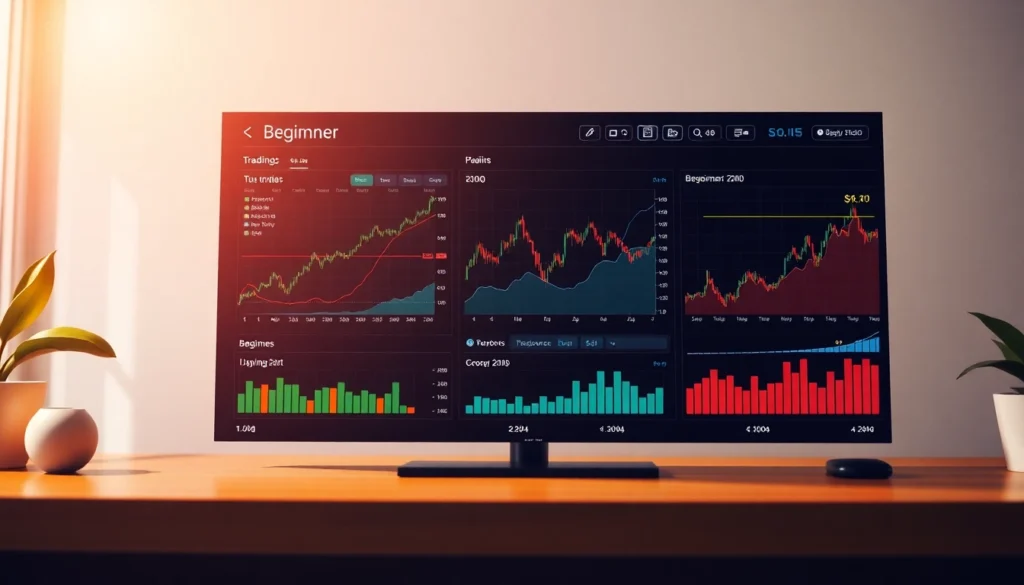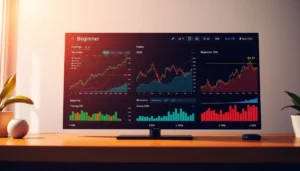
Getting Started with Online Trading for Beginners: A Comprehensive Guide
Embarking on a journey into online trading can be both exciting and intimidating. With opportunities to build wealth, diversify your financial portfolio, and develop new investment skills, trading has become more accessible than ever. However, for beginners, understanding the fundamentals, selecting the right platforms, and managing risks are critical steps toward success. If you’re ready to explore this dynamic market, this guide offers in-depth insights and practical strategies to help you navigate the initial phases confidently. To explore more about this topic, visit Online Trading for Beginners.
Understanding the Basics of Online Trading for Beginners
What is Online Trading and Why Start Now?
Online trading involves buying and selling financial instruments—such as stocks, forex, commodities, or cryptocurrencies—through internet-based platforms. It provides retail investors the ability to participate actively in markets that were traditionally reserved for institutional players. The digital revolution has democratized access, enabling individuals anywhere with an internet connection to manage their investments conveniently.
Starting now is advantageous due to the increasing availability of educational resources, advanced trading tools, and diverse asset classes. Additionally, economic shifts, technological innovations, and evolving market dynamics create opportunities for profit at virtually any stage of the economic cycle. Engaging early allows you to develop skills, understand market behaviors, and establish a disciplined trading routine essential for long-term success.
Common Challenges for Beginners in Online Trading
Many newcomers face obstacles such as emotional decision-making, information overload, and the misconception of quick riches. They often underestimate the importance of a solid strategy and risk management, risking substantial losses early on. Furthermore, navigating complex platforms and understanding market signals can seem daunting without proper guidance.
Understanding these challenges and adopting a structured learning approach significantly increases the chance of sustained profitability and reduces frustration along the way.
Types of Trading Platforms Suitable for New Users
Selecting an intuitive, cost-effective, and feature-rich platform sets the foundation for your trading journey. Some platforms are designed specifically for beginners, providing simplified interfaces, educational tools, and demo accounts for risk-free practice.
Popular options include Robinhood, Moomoo, eToro, and Fidelity—each offering demo accounts and easy onboarding processes. Features to look for include real-time data, user-friendly dashboards, comprehensive educational resources, and strong customer support.
Essential Skills and Knowledge for Successful Beginner Trading
Creating a Solid Trading Plan from Scratch
A well-structured trading plan lays out your investment goals, risk appetite, preferred trading styles, and rules for entry and exit. Key components include defining target returns, maximum acceptable losses (stop-loss), and daily trading limits.
Start by analyzing your personal financial situation and risk tolerance. Incorporate realistic expectations and avoid emotional reactions to market fluctuations. Document your plan and adhere to it consistently, reviewing and adjusting as you gain experience.
Learning Technical and Fundamental Analysis
Technical analysis involves studying price charts, patterns, and indicators to predict future market movements. Fundamental analysis examines economic data, company financials, and news events to assess intrinsic value and long-term potential.
Mastering both approaches enhances your ability to make informed decisions. For instance, technical signals help with short-term trades, while fundamental insights support longer-term investment strategies.
Managing Risk and Emotions Effectively
Risk management is crucial for long-term survival in trading. Techniques include setting stop-loss orders, diversifying your portfolio, and limiting leverage. Managing emotions prevents impulsive decisions driven by fear or greed, which are often behind significant losses.
Practicing mindfulness, maintaining discipline, and sticking to your trading plan mitigate emotional volatility. Using journaling and routine review sessions can help identify biases and improve decision-making processes.
Step-by-Step Guide to Getting Started in Online Trading for Beginners
Choosing the Right Broker and Platform
Research is vital. Look for brokers with regulatory approval, transparent fee structures, and accessible customer support. Features such as demo accounts, educational content, and user-friendly interfaces favor beginners. Consider platforms like Fidelity, Charles Schwab, Robinhood, or M1 Finance, which have earned a reputation for reliability and ease of use.
Opening and Funding Your First Trading Account
Once you’ve selected a broker, the process typically involves providing identification, completing a Know Your Customer (KYC) process, and linking a bank account. Funding your account can range from small initial deposits to larger sums based on your risk comfort and financial plans.
Placing Your First Trades and Monitoring Performance
Start with small, low-risk trades to familiarize yourself with the platform. Use limit or market orders for quick execution. Monitor your trades regularly, keep records, and evaluate performance against your trading plan. Continuously refine your strategies based on insights and market feedback.
Advanced Tips for Growing as a Beginner Trader
Utilizing Trading Tools and Educational Resources
Leverage charting software, news feeds, and algorithmic tools to enhance decision-making. Many platforms offer tutorials, webinars, and market analysis reports. Consistent learning through reputable sources accelerates skill development and keeps you updated on market trends.
Implementing Proven Strategies for Consistent Results
Popular techniques include trend following, swing trading, and scalp trading—each suited for different risk profiles and time horizons. Backtest strategies using demo accounts to validate their effectiveness before deploying real capital.
Tracking Progress and Adjusting Your Approach
Maintain a trading journal documenting each trade, rationale, and outcome. Analyze patterns, identify strengths and weaknesses, and adapt your strategies accordingly. Regular performance reviews ensure continuous improvement and risk control.
Resources and Communities to Support Your Trading Journey
Top Online Courses, Webinars, and Tutorials
Numerous educational platforms—such as IG Academy and Investopedia—offer beginner courses covering basics, analysis techniques, and risk management. Many brokerages also provide proprietary training resources tailored to their platform features.
Joining Trading Forums and Mentorship Programs
Engaging with communities like Reddit’s r/investing, and participating in mentorship programs accelerates learning through shared experiences. These forums offer insights, trading ideas, and emotional support, which are vital during challenging phases.
Staying Updated with Market News and Trends
Follow financial news outlets, economic calendars, and market alerts. Staying informed about global events, policy changes, and earnings reports helps anticipate market movements and refine your trading decisions.




